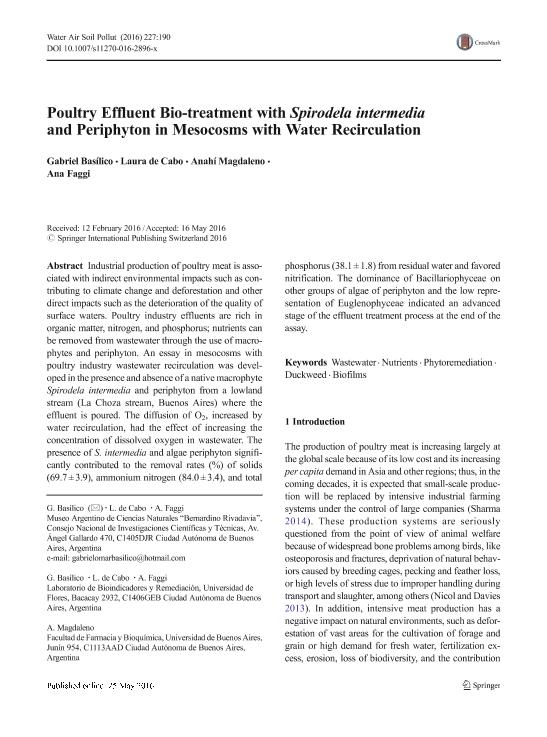Mostrar el registro sencillo del ítem
dc.contributor.author
Basílico, Gabriel Omar

dc.contributor.author
de Cabo, Laura Isabel

dc.contributor.author
Magdaleno, Anahí

dc.contributor.author
Faggi, Ana Maria

dc.date.available
2018-05-30T14:20:00Z
dc.date.issued
2016-05
dc.identifier.citation
Basílico, Gabriel Omar; de Cabo, Laura Isabel; Magdaleno, Anahí; Faggi, Ana Maria; Poultry Effluent Bio-treatment with Spirodela intermedia and Periphyton in Mesocosms with Water Recirculation; Springer; Water, Air and Soil Pollution; 227; 6; 5-2016; 190-201
dc.identifier.issn
0049-6979
dc.identifier.uri
http://hdl.handle.net/11336/46587
dc.description.abstract
Abstract: Industrial production of poultry meat is associated with indirect environmental impacts such as contributing to climate change and deforestation and otherdirect impacts such as the deterioration of the quality ofsurface waters. Poultry industry effluents are rich inorganic matter, nitrogen, and phosphorus; nutrients canbe removed from wastewater through the use of macrophytes and periphyton. An essay in mesocosms withpoultry industry wastewater recirculation was developed in the presence and absence of a native macrophyteSpirodela intermediaand periphyton from a lowlandstream (La Choza stream, Buenos Aires) where theeffluent is poured. The diffusion of O2,increasedbywater recirculation, had the effect of increasing theconcentration of dissolved oxygen in wastewater. Thepresence ofS. intermediaand algae periphyton significantly contributed to the removal rates (%) of solids(69.7 ± 3.9), ammonium nitrogen (84.0 ± 3.4), and totalphosphorus (38.1 ± 1.8) from residual water and favorednitrification. The dominance of Bacillariophyceae onother groups of algae of periphyton and the low representation of Euglenophyceae indicated an advancedstage of the effluent treatment process at the end of theassay.
dc.format
application/pdf
dc.language.iso
eng
dc.publisher
Springer

dc.rights
info:eu-repo/semantics/openAccess
dc.rights.uri
https://creativecommons.org/licenses/by-nc-sa/2.5/ar/
dc.subject
Wastewater
dc.subject
Nutrients
dc.subject
Phytoremediation
dc.subject
Duckweed
dc.subject
Biofilms
dc.subject.classification
Meteorología y Ciencias Atmosféricas

dc.subject.classification
Ciencias de la Tierra y relacionadas con el Medio Ambiente

dc.subject.classification
CIENCIAS NATURALES Y EXACTAS

dc.title
Poultry Effluent Bio-treatment with Spirodela intermedia and Periphyton in Mesocosms with Water Recirculation
dc.type
info:eu-repo/semantics/article
dc.type
info:ar-repo/semantics/artículo
dc.type
info:eu-repo/semantics/publishedVersion
dc.date.updated
2018-05-24T14:30:34Z
dc.journal.volume
227
dc.journal.number
6
dc.journal.pagination
190-201
dc.journal.pais
Alemania

dc.journal.ciudad
Berlin
dc.description.fil
Fil: Basílico, Gabriel Omar. Consejo Nacional de Investigaciones Científicas y Técnicas. Oficina de Coordinación Administrativa Parque Centenario. Museo Argentino de Ciencias Naturales "Bernardino Rivadavia"; Argentina. Universidad de Flores; Argentina
dc.description.fil
Fil: de Cabo, Laura Isabel. Consejo Nacional de Investigaciones Científicas y Técnicas. Oficina de Coordinación Administrativa Parque Centenario. Museo Argentino de Ciencias Naturales "Bernardino Rivadavia"; Argentina. Universidad de Flores; Argentina
dc.description.fil
Fil: Magdaleno, Anahí. Universidad de Buenos Aires. Facultad de Farmacia y Bioquímica; Argentina
dc.description.fil
Fil: Faggi, Ana Maria. Consejo Nacional de Investigaciones Científicas y Técnicas. Oficina de Coordinación Administrativa Parque Centenario. Museo Argentino de Ciencias Naturales "Bernardino Rivadavia"; Argentina. Universidad de Flores; Argentina
dc.journal.title
Water, Air and Soil Pollution

dc.relation.alternativeid
info:eu-repo/semantics/altIdentifier/doi/https://dx.doi.org/10.1007/s11270-016-2896-x
dc.relation.alternativeid
info:eu-repo/semantics/altIdentifier/url/https://link.springer.com/article/10.1007%2Fs11270-016-2896-x
Archivos asociados
